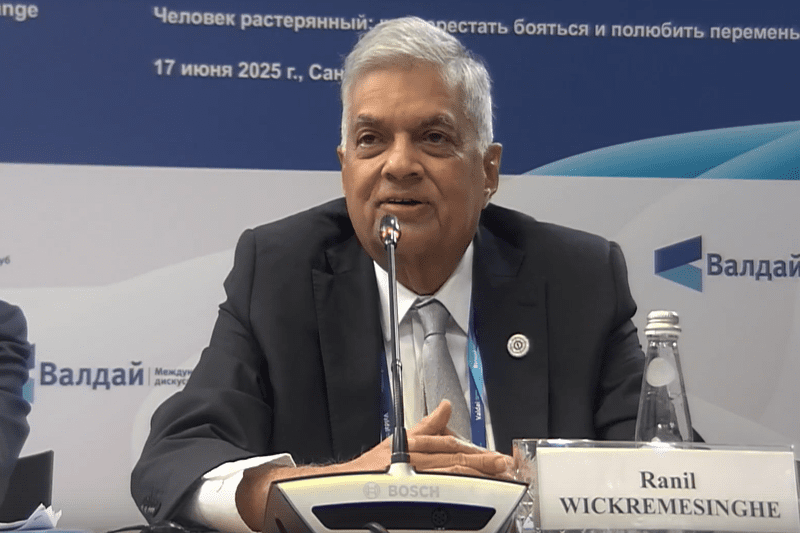-By LeN International Affairs Correspondent

(Lanka-e-News -25.June.2025, 5.20 AM) Former Sri Lankan President Ranil Wickremesinghe on 18th June delivered a blistering critique of the recent G7 communique on the escalating Israel–Iran confrontation, effectively assuming the mantle of Iran’s chief defender at a high-profile foreign policy forum. Speaking at the Valdai Discussion Club roundtable in Saint Petersburg, Mr Wickremesinghe denounced the G7’s endorsement of Israel’s “self-defence” strikes against Iranian targets as both unilateral and untimely, given ongoing diplomatic exchanges.
“The 60-day deadline given to Iran for a renewed agreement elapsed, yet the United States pressed on regardless,” he declared. “This notion of self-defence, sprung upon a still-labouring negotiation, is profoundly harmful.”
His intervention, reminiscent of the acerbic tone often heard from Tehran’s own spokesman, drew a warm reception from an audience that included senior Russian diplomats and former Western envoys. Analysts say Mr Wickremesinghe’s performance underscores a broader realignment in global discourse, as once-subordinate voices adopt increasingly muscular stances.
In a pointed riff on transatlantic solidarity, Mr Wickremesinghe inveighed against U.S. overreach. “One cannot rewrite the rules of trade or impose fresh tariffs without consulting those halfway across the globe,” he admonished, casting the G7 as an inward-looking caucus ill attuned to emergent markets.
He reserved special barbs for President Donald Trump and Secretary of State Marco Rubio, advising them to “acknowledge the transformation of the global order and adapt accordingly.” Though both men are on extended political hiatus, Wickremesinghe’s jibe served as an unmistakable reminder that Washington’s sway is no longer pre-eminent in every theatre.
Turning from the Middle East to the Indo-Pacific, Mr Wickremesinghe credited former Japanese Prime Minister Shinzo Abe with coining the term, but lamented that it has since hardened into “a quasi-military alliance” dominated by US, Australian, UK and Japanese interests. “Australia belies its name by crossing from the Pacific into the Indian Ocean,” he quipped, “and yet we find Britain there too—an island power policing someone else’s backyard.”
He argued that the era of unipolarity has yielded to multipolarity, with Asia, Africa, Eurasia and Latin America ascending in turn. “In the game of geopolitics, we are the grass beneath the elephant’s feet,” he mused, “yet we grow ever greener. Technological competition no longer belongs exclusively to the West—China, India, Russia and our Eurasian neighbours are all contenders.”
Arguing for institutional reform, Wickremesinghe proposed that the G7 cede its primacy to the G20, thereby acknowledging the growing clout of BRICS nations. “It is time for a club that actually reflects today’s economic reality, not one frozen in the NATO-era map,” he asserted.
The former President praised the Indian Ocean’s burgeoning centrality to global trade, noting Russia’s deepening economic engagement in the region and the de facto rupee-rouble currency swap agreed last year. “Our shared coastline is now a conduit for mutual prosperity,” he said, invoking the Bandung principles of non-alignment—an ideological cornerstone for many Global South countries.
Wickremesinghe was at pains to underline the spill-over of the Israel–Iran conflict into maritime corridors previously thought insulated. “For the first time, Israel has been drawn into the Indian Ocean theatre,” he warned. He lamented the absence of a clear demarcation in the Pacific, where the Taiwan question simmers, arguing that “the Indian Ocean region has preferred to steer clear” of that flashpoint.
Observers at Valdai noted the irony of a politician, known to many as a cautious centrist, adopting a posture more combative than Iran’s own diplomacy. By so vociferously attacking a Western communique, Mr Wickremesinghe has, intentionally or not, positioned himself as a leading voice for dissenting powers, even as he contends with domestic political headwinds back in Colombo.
Whether this foray will earn him renewed influence on the world stage—or merely amuse his hosts—remains to be seen. For now, the former President’s transformation into a de facto Iranian foreign minister has provided one of the forum’s most unexpected talking points. And as the multipolar future unfolds, it appears that familiar roles in international diplomacy are up for renegotiation.
-By LeN International Affairs Correspondent
---------------------------
by (2025-06-24 23:53:57)
Leave a Reply